#7
KQ
Kenya Airways, fondly known as KQ, is one of Africa’s top airlines, connecting 42 global destinations, 35 of which are in Africa. With an annual passenger count of over four million, KQ is rapidly evolving into a symbol of service reliability, operational excellence and customer centricity following in its turnaround strategy under Allan Kilavuka, the current Chief Executive Officer (CEO).
The airline is firmly dedicated to its Environment, Social, and Governance (ESG) strategies, which revolve around harnessing its strengths to accomplish crucial objectives. These objectives encompass protecting the environment, guaranteeing customer safety and security, fulfilling social responsibilities to communities in a sustainable manner, and meeting the diverse needs and expectations of stakeholders effectively.
Setting sights on environmental protection, KQ actively participates in The Sustainable Flight Challenge (TSFC) – a competition inspired by the historic 1934 London to Melbourne aviation race – which fosters innovations for sustainable aviation. In 2023, KQ pioneered the use of Sustainable Aviation Fuel (SAF) in TSFC on a commercial flight out of Africa, marking the first step towards SAF implementation in Africa. This pilot project also provides crucial data for policy-making and industry best practices, reinforcing the airline’s dedication to reducing its environmental impact. Based on these contributions, KQ won the ‘Most Impactful Breakthrough on SAF’ and ‘Best Innovation’ awards from SkyTeam.

Further, KQ is a proud volunteer participant of CORSIA – Carbon Offsetting and Reduction Scheme for International Aviation, a global program aimed at reducing carbon emissions from international flights. Since 2019, KQ has been monitoring, reporting, and verifying the emissions generated by its international flights as part of its commitment to CORSIA. This data collection and reporting are essential steps in the scheme’s implementation, as they help track the carbon emissions from the aviation industry. This year, CORSIA is set to enter its first offsetting phase. During this phase, airlines, KQ included, will be required to offset a portion of their international flight emissions by investing in projects that reduce or remove carbon dioxide from the atmosphere, marking a significant step in the global effort to address aviation-related emissions and combat climate change.
KQ’s subsidiary, Fahari Aviation, is a leading aviation technology company dedicated to advancing sustainable urban transport through drone technology in precision agriculture, conservation, surveillance, and logistics. By 2028, Fahari Aviation aims to introduce air taxis, revolutionising urban air mobility in an eco-friendly manner. The company’s strategic use of drone technology ensures it stays at the forefront of innovation, anticipating and addressing future urban transport needs.
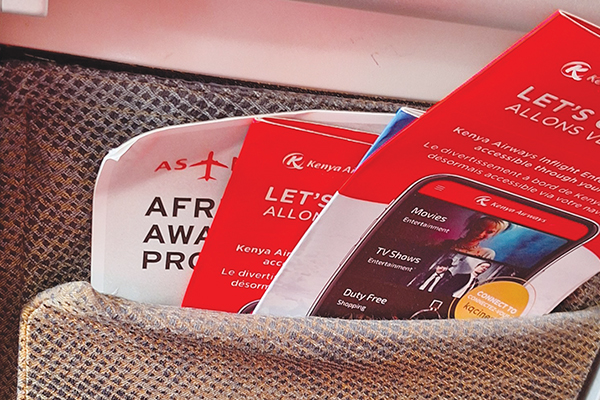
Shifting focus to the social dimension of ESG practices, within the aviation sphere, safety transcends being a mere requirement to embody a fundamental commitment. This truth resonates deeply with KQ, which prioritises the wellbeing of its customers above all else. Its safety and quality policies meticulously encompass fundamental safety components, occupational safety and health, and compliance requirements, ensuring strict adherence to regulatory standards and responsible practices at every touchpoint within the corporation, including its contracted partners. These policies reflect its unwavering promise: open to receiving feedback from any source, whether it be a customer or employee; meticulously complying with all regulations, rules, and standard operating procedures in the execution of the airline’s duties; consistently minimising exposure to risks for both customers and employees; and promptly and decisively addressing issues as they arise without making assumptions or reservations. Above all, KQ is steadfastly committed to the continuous enhancement of its safety and quality practices, for all stakeholders involved.
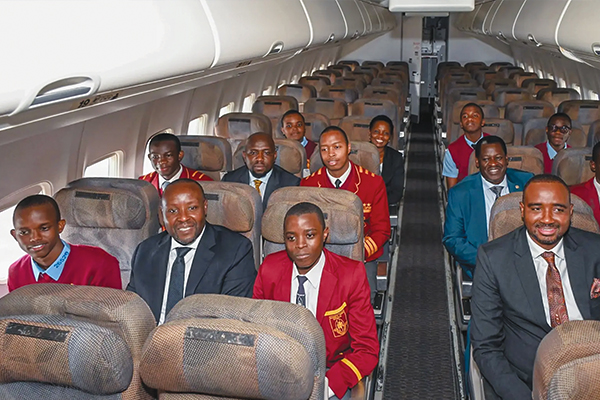
for aspiring aviation students and prepare them for careers in the industry.
The airline focuses on fostering a healthy corporate culture, promoting diversity and inclusion, upholding human rights, and positively engaging with communities. Further, KQ plays an active role in protecting endangered species from abhorrent trade. Through United for Wildlife, KQ comes together with some of the world’s largest businesses in the transport and financial sectors to break the chains of the illegal wildlife trade.
The Kenya Airways Fahari Innovation Hub is a beacon of aviation advancement in Africa, embodying KQ’s commitment to social responsibility. This unique centre encourages creative solutions to business challenges and promotes collaboration, networking, research, and learning. With a strategic focus on innovation management, KQ stimulates and implements novel ideas, providing expertise, resources, and support to foster a culture of innovation. Through programs like Corporate Innovation and Open Innovation initiatives, KQ engages employees and external partners, encouraging ideation, process improvements, and the development of innovative solutions. The airline’s dedication to nurturing an innovation mindset is evident in its training and development programs, empowering employees and collaborating with startups to improve customer and employee experiences; as well as driving innovation for sustainability. Additionally, KQ’s initiatives in disability inclusion, facility upgrades, and idea pipeline management demonstrate its holistic approach to social impact, reinforcing its commitment to creating a sustainable and innovative future for all stakeholders.
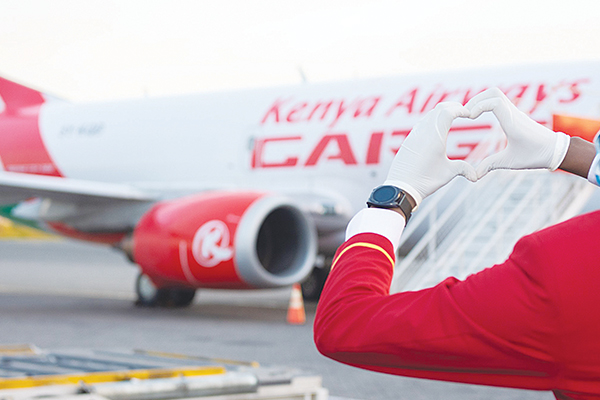
In terms of governance, KQ demonstrates a strong commitment to sound corporate practices. The company has developed and regularly reviews a comprehensive Board Charter, clearly outlining the Board’s responsibility for internal control. This Charter, available in Sections 1.2 and 5, also emphasises the Board members’ accountability for applying corporate governance policies and procedures, as reiterated in the Corporate Governance Statement within the Annual Report. To ensure widespread awareness and compliance, the Board has made the Code accessible on the company’s official website.
Additionally, KQ’s Board has established procedures ensuring access to pertinent, accurate, and complete information for its members. Board members have unrestricted access to all relevant data, and professional advice is sought only after Board approval. These practices, detailed in the Board Charter and the Corporate Governance Statement, underscore KQ’s dedication to upholding good governance principles, ensuring transparency, and fostering a culture of integrity within the corporation.
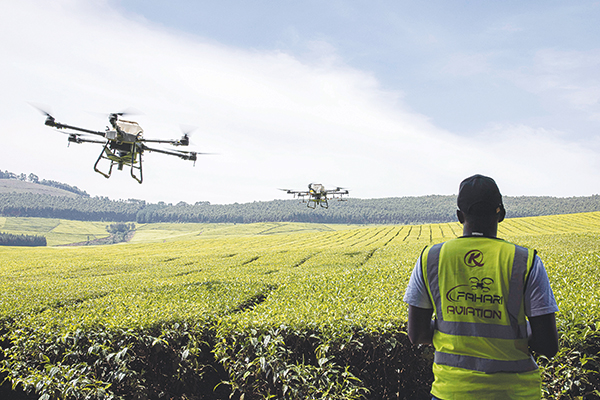
Towards its stakeholders, the Board at KQ adopts a stakeholder-inclusive approach in its corporate governance practices, as evidenced by the Stakeholder Engagement Policy approved by the Board. This policy outlines the rights of stakeholders and is complemented by the Communications Policy, ensuring systematic management of relations with various stakeholder groups. Prior to decision-making, the Board meticulously considers the interests of key stakeholders by evaluating all associated risks, aligning actions with the best interests of the company. To maintain effective communication channels, KQ provides stakeholders with comprehensive access to relevant information through the official website, annual reports, and investor briefs. Moreover, KQ has established a formal dispute resolution process, clearly outlined in the Board Charter (section 39) and the publicly available Dispute Resolution Policy, demonstrating the airline’s commitment to transparency, inclusivity, and ethical practices in stakeholder engagement.
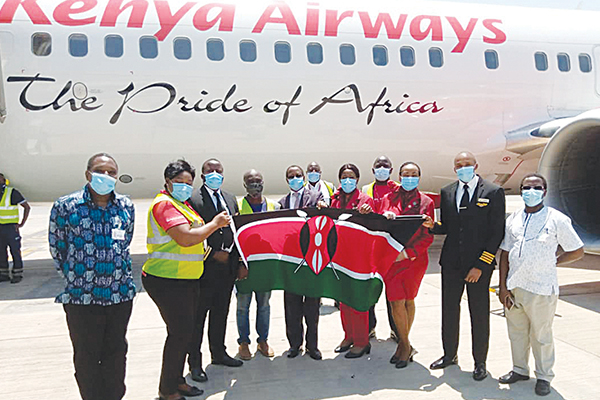
KQ’s robust ESG practices undeniably pave the way for the fulfilment of its core purpose: ‘To contribute to the sustainable development of Africa.’ Through its unwavering commitment to environmental stewardship, social responsibility, and strong governance principles, KQ sets a benchmark in the aviation industry.
















